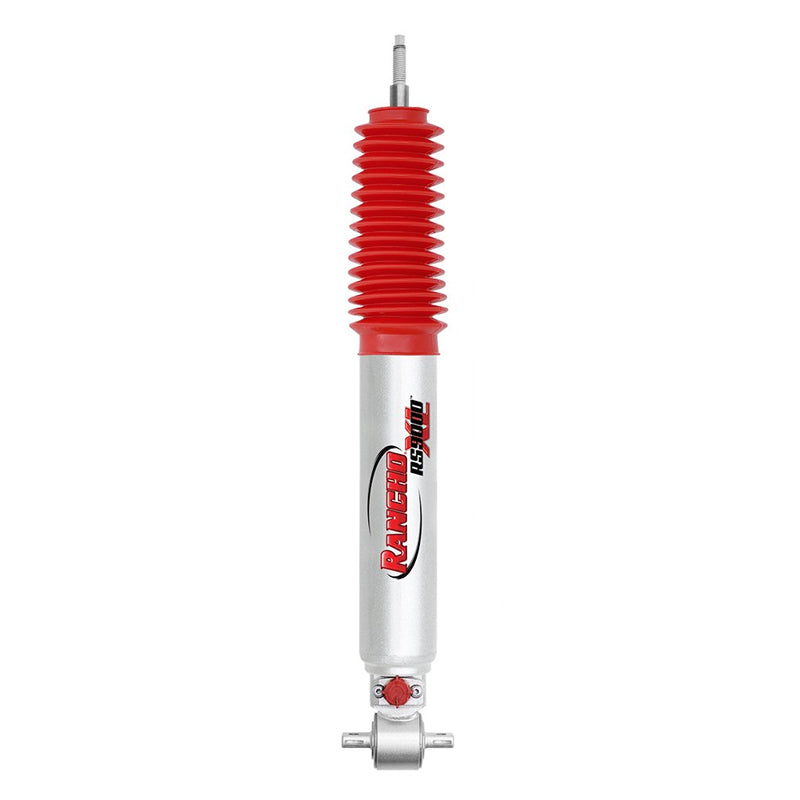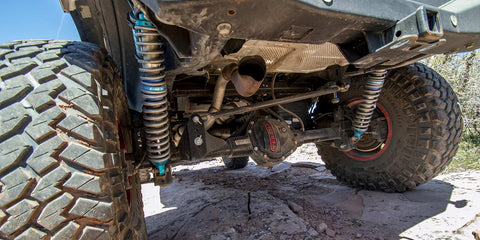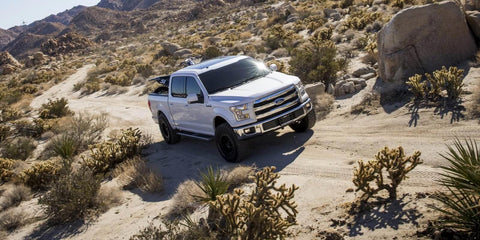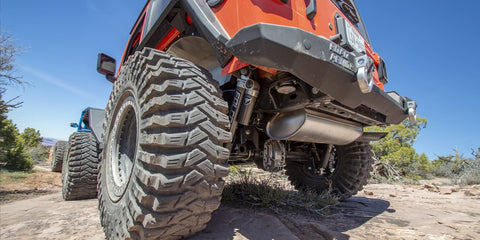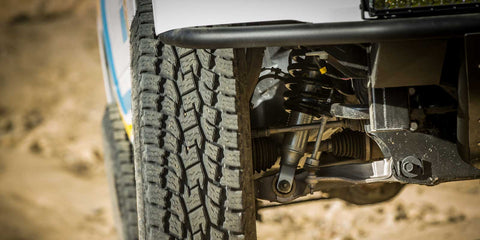Rancho vs Fox Shocks - Comparisons and Real World Advice
Posted by Sean Reyes on

We cover the "Rancho vs Fox Shocks???" debate that rages on across numerous automotive forums. There are so many different types of drivers and uses of a truck or Jeep, its hard to get an objective read on what these two brands of shocks mean for your vehicle. We're going to lay out specs for you to figure out the best shock for your intended use.
Rancho RS9000XL vs Fox 2.0
Being similarly priced ($125/ea vs $169/ea), these two shock series are regularly comparison shopped against each other for the vehicle in question. Super Duty or Heavy Duty truck owners like the RS9000XL shocks due to their adjustable nature for heavier loads or towing. Lighter trucks and Jeeps that value adventurous or off-road performance usually prefer the Fox 2.0. Lets get this straight, every driver is different for what they want out of a shock.

RS9000XL Design
The RS9000XL is a 2.75" tri-tube design, the large body provides a greater amount of oil in the event you run this shock through its paces, it can remain relatively cool with low risk of fade. The internal working piston of the Rancho RS9000XL is 31mm - small by modern shock absorber standards.
The adjustable knob controls low speed compression, which impacts cornering, nose dive, rear squat on accelleration, all are considered low speed shock actions. Learn More About Adjustable Shocks in Action
-
Pros
Good price for an adjustable shock, jack of all trades kind of shock, regularly goes on promotion from Rancho to where 1 out of the 4 shocks comes out being free (or close to it)
-
Cons
Not a true performance shock (Rancho runs RS7000MT or RS5000X on most of their vehicle builds, not a coincidence), many moving parts which lead to higher failure rates

Fox 2.0 Design
The Fox 2.0 IFP is a 2" aluminum bodied shock, which resist corrosion a little better than the Rancho steel body, meaning the Fox aluminum body does better on the east coast with all that salt.
The 2.0 IFP Performance series shock is also a monotube design, with an Internal Floating 46mm Piston that gets pushed around by the piston rod. This leads to more consistent damping characteristics through the full range of travel compared to Rancho's 31mm piston.
While there are adjustable upgrades to the base Fox 2.0 IFP shock, that upgrade comes at a price tag of $349/ea (+adjustment, +reservoir).
-
Pros
A true entry level performance shock, made with tried and true race-level aluminum parts. You can run these shocks really hard and reliably, low failure rates help the longevity of these shocks. A good longterm investment if you plan on recommended service intervals. Fox's high speed damping is significantly better than anything Rancho has, meaning those aggressive obstacles, flat landings, or surprise obstacles get absorbed much better.
-
Cons
Much more than most truck or Jeep shocks, coming in around $600 for the set of 4. All of Fox's truck and Jeep shocks have a recommended service interval, 25k / 35k / 50k miles depending on total off-road use & abuse. Will ride noticeably firmer on the highway or your commute than most other shocks.
Shock Showdown
The biggest factor to consider between these two shocks is You, and Your driving habits. Do you like to go fast off-road and vehicle maintenance be damned? Get the Fox. From our tests and reviews, the Fox 2.0 provides noticeably better handling to the vehicle through better rebound damping. Where the Rancho sometimes felt sloppy on bigger bumps, Fox kept the vehicle more composed.
If you're more the slow-goer, or you haul heavy loads regularly, or you tow the trailer n toys, the RS9000XL is probably for you. If you're more concerned with daily driving comfort and that plush feel, get the Rancho. If you have big things planned for your build, including a lot of adventures, the Rancho isn't a bad option if you get it on rebate promotion, which would put the RS9000XL set at half the price of the Fox 2.0, leaving money for other adventure-goodies.
A specific note about the RS9000XL option: Rancho's adjustable shock allows for firm or soft shock response upon compression actions. Fox also has the same type of adjustable shocks with their reservoir options, but these run significantly more than the RS9000XL parts, $350/ea (Fox CD Adj) vs $110 (RS9XL Adj). There are significant design differences as well between the Fox and Rancho adjustable shocks, which we'll cover in another post.
Pricing
Hopefully the above rundown shows why there's a big price difference between these series.
Fox 2.0 IFP vs Rancho RS7000MT
We're going to focus on Fox's 2.0 IFP Performance series compared to the Rancho RS7000MT Monotube shocks, both being heavy considerations for the truck and Jeep market for a performance upgrade.

|
Body Size |
Body Material |
Rod Size |
Rod Material |
Rebuildable |
|
|
FOX 2.0 |
2” |
Aluminum |
⅝” |
Chrome Plated Steel |
Yes |
|
RS7000MT |
1.9” |
Steel |
½” |
Chrome Plated Steel |
No |
Besides the bullet pointed differences, lets get into what the specifications actually mean and translate to for your vehicle. All 3 shocks are a monotube gas charged design, meaning there's an internal floating piston, attached to the piston rod, which pushes shock fluid through the valves on the piston to regulate damping. Neither company reveals exact PSI numbers on the nitrogen gas charge, but we expect Fox to be approaching 300psi, while Rancho is closer to 200. Higher PSI typically translates to firmer ride due to internal shock pressures, which affects valving and damping characteristics.
The aluminum body of the Fox 2.0 Performance shocks provide a couple different benefits; lighter overall weight, and more importantly, better heat dissipation. The longer a shock can remain cool, or shed heat, the better performance it provides due to less cavitation of shock fluid inside the shock. Heat dissipation is only a factor if you’re planning extensive off-road driving on aggressive terrain at moderate speeds. The Rancho RS7000MT isn’t aimed at those drivers, the RS7000MT series is aimed at the weekend warrior who prefers a nice ride during the week, but can also handle some trails and mild off-road in between.

- Fox 2.0 Performance can be rebuilt and recharged (nitrogen gas), this makes any Fox Performance shock a lifetime shock that can last the life of any vehicle.
- Fox 2.0 Adventure Series is rebuildable, but cost prohibitive, might as well buy new shocks.
- Rancho RS7000MT (and all other Rancho shocks) are not rebuildable.
Every shock is technically rebuildable, but is a $50-75 shock rebuild (each) worth it when the shock itself cost $80? Not likely.
Pricing
Hopefully the above rundown shows why there's a big price difference between these series.
Shock Showdown
If Fox is within your budget, and you're the type of vehicle owner that is using your truck extensively for off-road driving, expeditions, camping, or sport, then Fox is a great investment. If you're budget conscious, and prefer a smoother highway ride during the daily commute over ripping it up on the weekends, then pickup the Rancho RS7000MT. Rancho products can also be gotten at a heavy discount during one of their semi-yearly rebate periods, equating to a free shock refund when buying 4 shocks.


